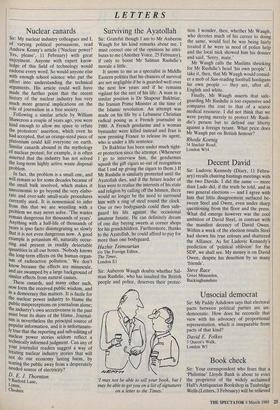Surviving the Ayatollah
Sir: Grateful though I am to Mr Auberon Waugh for his kind remarks about me, I must correct one of the opinions he attri- butes to me (Another Voice, 25 February), if only to boost Mr Salman Rushdie's morale a little.
It seems to me as a specialist in Middle Eastern politics that his chances of survival are not negligible if he is guarded well over the next few years and if he remains vigilant for the rest of his life. A man in a similar position is Dr Shapour Bakhtiar, the Iranian Prime Minister at the time of the Islamic revolution. An attempt was made on his life by a Lebanese Christian radical posing as a French journalist in 1980. A French gendarme and a woman bystander were killed instead and Iran is now pressing France to release its agent, who is under a life sentence.
Dr Bakhtiar has been under much tight- er protection since the attempt. (Whenever I go to interview him, the gendarmes squash the gift cigars so out of recognition that I end up giving the cigars to them.) If Mr Rushdie is similarly protected until the Ayatollah dies, and if the future leader of Iran were to realise the interests of his state and religion by calling off the hitmen, there would no longer be the need to surround him with a ring of steel round the clock. One or two bodyguards could then safe- guard his life against the occasional amateur fanatic. He can definitely dream of one day buying sweets at corner shops for his grandchildren. Furthermore, thanks to the Ayatollah, he could afford to pay for more than one bodyguard.
Hazhir Teimourian
do The Foreign Editor, The Times, London El
















































 Previous page
Previous page